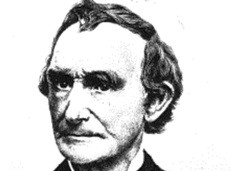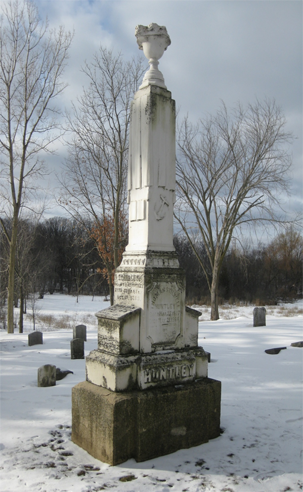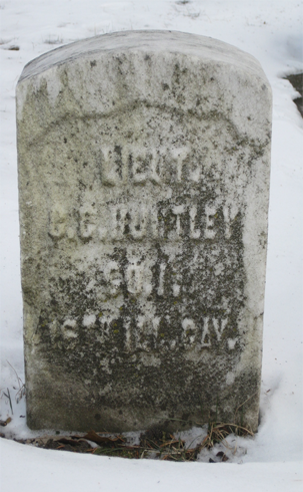 The best known name in the village is, of course, that of the Huntleys.
The best known name in the village is, of course, that of the Huntleys.
Village namesake Thomas S. Huntley, as well as his oldest son, Charles, led notable and interesting lives.
Thomas Huntley (1807-1894) was not the first settler to arrive in this area, but he was the first to envision a thriving community here.
Thomas Stillwell Huntley was born March 27, 1807, in Cortland County, New York and lived most of his young adult life there.
Much is known about Thomas Huntley from his lengthy obituary, published in the 1894 Huntley News, and republished in “Huntley Centennial: 1851-1951.”
His pioneering and entrepreneurial spirit most likely came from his father, an early settler in Cortland County, who owned nearly all of Ellicottville, New York, including numerous sawmills and farms and a large, prosperous hotel and tavern.
Thomas Huntley was a studious child who received a good education for his time. He worked on his family’s farm and in the family businesses until the age of 20. At that time he became a merchant, eventually owning a store of his own.
Thomas Huntley came from an active and prominent family in Ellicottville, New York, and he himself was an active member of the Ellicottville community. He served as town supervisor in 1840 and was a justice of the peace. According to the town history, he was a founding member of the Ellicottville First Presbyterian Church.
In 1830 he married Eliza Fox, the sister of a New York State senator. Eliza also came from a prominent founding family of Ellicottville.
The Huntleys had three children, Charles, Harriet and William.
In 1846, Thomas Huntley sold his New York property, and headed west by team to open lands in Illinois, near where his brother-in-law Pliny Fox had settled in 1842.
Huntley bought a 640 acre section of farm land in Grafton Township at what is now Conley Road and Rt.47.
A few years later, he purchased two additional 40 acre parcels north of there. He paid $1.25 an acre.
Learning the Chicago and Northwestern Railroad line was to go through south of his property, Huntley purchased 80 acres along the proposed railroad line.
On this property he furnished a site for the train station, opened a small general store, built a home, sold lots for businesses and residences, earmarked three lots for churches, set aside another piece to be the town square park, donated land for a cemetery, and thus established Huntley Grove, which also became known as Huntley Station, and then simply Huntley.
The first train came through to the town September 5, 1851.
Because of the rail line, Huntley became a shipping center for butter, eggs, milk and other farm and dairy products, and the town prospered.
Huntley’s young son William died in 1852 at the age of 14. Often omitted from references to Huntley’s children, the 1850 McHenry County/Grafton Township census records indicated William was alive at that time and living with his parents in Huntley. In October of 1850, he was listed as being 12 years old. The cause of William’s death is unknown, although it is known that typhoid fever was rampant in the area in the early 1850s.
 In that same 1850 census, Thomas Huntley was listed as a farmer, owning real estate valued at more than $2,100. In 1856 he built a beautiful home on Woodstock Street which still stands today.
In that same 1850 census, Thomas Huntley was listed as a farmer, owning real estate valued at more than $2,100. In 1856 he built a beautiful home on Woodstock Street which still stands today.
Thomas Huntley was an active, public-spirited man, but never aspired to official office. The only office he ever held was as the first supervisor of Grafton Township.
A religious and sympathetic man, Huntley was a founding and active member of the First Congregational Church. He served the church as a deacon and elected church official. He served on the church finance committee, donating much money and even a piano, to the church.
 He was said to have led a temperate life, never even using tobacco, and was always in good health and good spirits, a cheerful and pleasant man.
He was said to have led a temperate life, never even using tobacco, and was always in good health and good spirits, a cheerful and pleasant man.
As he watched the village grow, he remained a wealthy farmer, accumulating large amounts of property in northern Illinois and in other states.
 He traveled extensively, from Atlantic to Pacific, by wagon team and by rail. He was an early member of the Republican Party and had strong feelings against slavery. He often loaned money to people and would never charge any interest. He trusted people, and he never lost money.
He traveled extensively, from Atlantic to Pacific, by wagon team and by rail. He was an early member of the Republican Party and had strong feelings against slavery. He often loaned money to people and would never charge any interest. He trusted people, and he never lost money.
Huntley’s first wife, Eliza, died in 1873, and in 1876 he married Emma Annette Brinkerhoff. He was 69 and she was 34.
In October 1878, at the age of 71, Huntley became father to his youngest son, Thomas Stillwell Huntley Jr., who was the only one of Huntley’s children to survive him.
When Emma died in 1882, she left the 75 year-old Thomas to rear their nearly 4-year-old son.
When Thomas Huntley died on May 21, 1894, at the age of 87, he was mourned not only as the town’s founder, but also as a much loved and well-respected citizen.
His obituary in the 1894 Huntley News said, “The (First Congregational) church was filled to its utmost capacity and many had to remain outside.”
The article commented that his “kindness and generosity will always be remembered so long as the history of this town remains.”
In prophetic commentary the obituary concluded saying Thomas Huntley’s “name shall be spoken hundreds of times daily for many generations to come.
 Another Huntley name to be recalled is that of Thomas’ older son, Charles. Charles Huntley (1834–1883) came to this area in 1846 with his family. At the time, he was about 12 years of age.
Another Huntley name to be recalled is that of Thomas’ older son, Charles. Charles Huntley (1834–1883) came to this area in 1846 with his family. At the time, he was about 12 years of age.
When the Civil War broke out he was among the first from the area to enlist. He assembled 300 other local men to join with him. He was a lieutenant and later a captain in the Sixteenth Illinois Cavalry. His troops were captured after a long battle at Strawberry Plains, Virginia, and Charles Huntley spent the remainder of the war in southern prisoner of war camps, including Libby, and the notorious Andersonville Prison camp in Georgia.
After the war he established a stagecoach route, and later mail route, through to the west. He was in business with his cousin, Silas Huntley, the son of Thomas Huntley’s brother Daniel.
Charles was a very adventurous and enterprising young man and a very astute businessman.
Among the companies in which Charles C. Huntley had an interest were the Northwest Stage Company, which was engaged in transporting mail and passengers on routes from the present day Fargo, North Dakota, through Montana and later, Oregon and into the Utah, Idaho, and Washington territories, and the Oregon & California Stage Company, which was engaged in similar business on the route from California, to Portland, Oregon.
The Wells Fargo Company eventually purchased the routes to add to their many routes, paying Huntley $10,000. That along with his earnings for a year and a half netted him $20,000 besides his stock.
Charles Huntley immediately established other routes, to Oregon and the Dakotas and managed these for eight years.
He was a wealthy man when paralysis, brought on by exposure and starvation during his prisoner of war years, caused him to abandon his business and return home to Huntley where he died at age 49.
Thomas Huntley, Charles Huntley and other members of the Huntley family are buried in the Huntley Cemetery on Dean Street.



